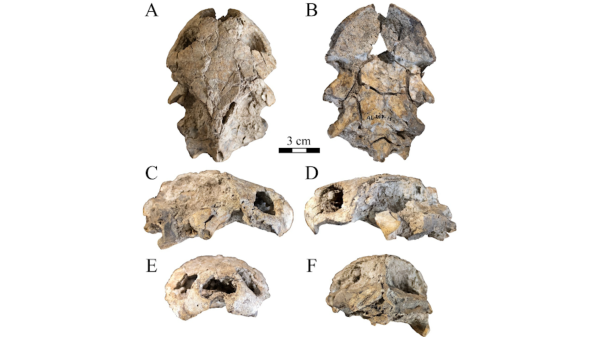ASU-led online portal advances digital learning in earth and space sciences

ASU's Infiniscope project is transforming learning across K–16 in the earth and space sciences.
Arizona State University’s Center for Education Through Exploration (ETX Center) has announced the launch of “Infiniscope” 2.0, the next generation of a NASA-funded online platform, which is transforming learning across K–16 in the earth and space sciences.
Infiniscope develops and deploys innovative digital learning experiences that promote STEM education and creative tools that empower educators to harness education technology as they see fit.
“ASU is designed to leverage technology and innovation to meet learners where they are with high-quality learning opportunities,” ASU President Michael M. Crow said. “Infiniscope 2.0 represents a new chapter in our efforts to imagine, create and disseminate world-leading technologies to educate more learners at scale.”
This project, created by experts at ASU’s School of Earth and Space Exploration and NASA’s Science Mission Directorate, provides inquiry-driven, AI-tutored activities designed around NASA-derived simulations and virtual field trips. It also provides a technology platform that enables educators to collaborate, create and customize their own digital learning activities in ways that are informed by what research shows is most effective. Launched in 2018, Infiniscope reaches a network of more than 4,500 educators, serving tens of thousands of learners, and is growing rapidly.
“One of NASA’s goals in this post-pandemic world is to create opportunities for better digital learning solutions that meet the collective needs of educators, scientists and lifelong learners. The Infiniscope 2.0 collection is a stunning achievement and a joy to explore,” said Kristen Erickson, director of NASA’s Science Activation (SciAct) program.
Infiniscope 2.0 is the outcome of a multimillion-dollar investment by NASA SciAct in a technology partnership between the ETX Center and the Open Learning Initiative at Carnegie Mellon University.
“This partnership has far-reaching goals to improve STEM education by empowering educators in various ways, from serving up sophisticated digital learning experiences to providing tools and training to enable them to create their own advanced digital content that meets the needs of their students as they know best,” said President's Professor Ariel Anbar, ETX center director.
“Growing the community of educators applying the insights of learning research is a core part of OLI’s mission,” said Norman Bier, director of the Open Learning Initiative. “I’m especially excited at this chance to help more science educators integrate evidence-based practices and technology into their teaching.”
The major features of the portal include a searchable and sortable virtual home, exploratory activities specifically designed to feature NASA data and subject-matter experts, adaptive feedback, personalized pathways that meet the needs of individual learners, and exploratory activities like simulations and virtual field trips that promote “learning by doing” — a hallmark of the ETX Center’s philosophy of “education through exploration.”
Science educators are enthusiastic about Infiniscope because it brings science to life.
“The Infiniscope content is rich. It contextualizes opportunities for students to problem-solve, to make sense of things, and to really figure out what’s going on,” said Craig Sipes, the STEAMStands for science, technology, engineering, arts and media. coordinator for Local District East of the Los Angeles Unified School District, one of more than 3,000 schools and districts around the country where Infiniscope is being used.
But Infiniscope is not just another internet portal. It’s the doorway to an innovative new teaching community centered on a digital platform that empowers a community of educators to collaborate, create, customize and share next-generation exploratory activities — not just to use what is already there.
This new version of Infiniscope is designed on a new foundation of open-source technology, which keeps costs low and makes it easier for educators to keep control of what they create.
“The open-source design of Infiniscope 2.0 means that we can provide a stable platform for educators that won’t get sold or disappear,” said Jessica Swann, who is the ETX Center’s program manager for teaching communities. “Teachers are often concerned that free, high-quality digital resources won’t remain openly available. We’re directly addressing that concern.”
The ETX Center-Open Learning Initative partnership is facilitated by Argos Education, a new company aiming to transform how technology is used for education, and by Unicon, an education software development company. Argos helped to develop, hosts and supports the new open-source technology stack.
“Argos Education is an end-to-end learning experience platform and courseware marketplace, one where educators and their collaborators can craft distinctive educational experiences and deliver them in ways that are a perfect fit for their learners,” said Curtiss Barnes, co-founder and CEO of Argos Education. “The Infiniscope educator community is a wonderful example of the kind of sharing and creativity we are fostering.”
Educators interested in learning more about Infiniscope are invited to join the community. As new features roll out in the coming months, they’ll be able to contribute their own adaptive lessons to the network, as well as enroll their students to see the different pathways they take as they move through an activity.
“Infiniscope 1.0 taught us that there’s an untapped demand out there among the most dynamic educators,” Anbar said. “When it comes to using technology in their teaching, they don’t just want to use the sort of great experiences modern platforms can provide. They want to create great experiences as well. With Infiniscope 2.0, we’re aiming to meet that demand — and transform STEM education as we do.”
More Science and technology

New research by ASU paleoanthropologists: 2 ancient human ancestors were neighbors
In 2009, scientists found eight bones from the foot of an ancient human ancestor within layers of million-year-old sediment in…

When facts aren’t enough
In the age of viral headlines and endless scrolling, misinformation travels faster than the truth. Even careful readers can be…

Scientists discover new turtle that lived alongside 'Lucy' species
Shell pieces and a rare skull of a 3-million-year-old freshwater turtle are providing scientists at Arizona State University with…